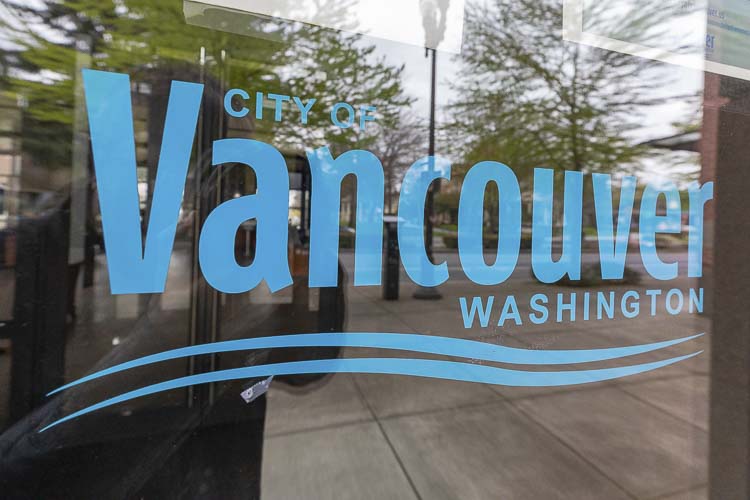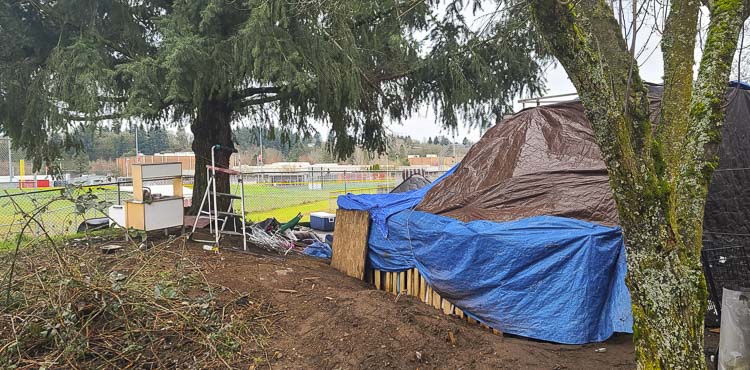
City Council member Bart Hansen wants the city to use common sense and take advantage of the Grants Pass v. Johnson ruling
Paul Valencia
ClarkCountyToday.com
Within hours of the ruling by the United States Supreme Court in the case regarding homelessness and a city’s authority to enforce anti-camping laws, the city of Vancouver released a statement.
In essence, Vancouver’s existing plan was still the way the city would proceed.
The Grants Pass v. Johnson ruling, issued on June 28, states that cities are not violating the U.S. Constitution by penalizing people for camping outside.
A few days later at the July 1 City Council meeting, City Manager Eric Holmes said: “We’re continuing to pursue the emergency response strategies.”
That includes a plan for a large facility with 150 beds that will feature drug treatment and other resources, a shelter that is expected to open in 2025. The city calls it a bridge shelter, a “bridge” for the homeless to transition into permanent housing.

In the meantime, not everyone is impressed with the city’s strategy. At a community forum last month, one woman noted that constant calls to the region’s non-emergency line, 3-1-1, were ignored or dismissed as she complained about fires being set near her home as well as garbage and drug needles being discarded on her property. She noted that one person tried to get on her porch for the purpose of having a place to “shoot up” drugs.
For years, Clark County Today has reported on similar complaints at various locations throughout the region.
Leverich Park and the nearby Burnt Bridge Creek and Ellen Davis Trails were not cleaned up until considerable damage was done and not until council members Hansen and Sarah Fox toured the park and the devastation created by those camping there.
It took months of complaints and accusations of crimes for a campsite in Orchards to be cleared. Nearby employes of businesses felt like hostages in their own neighborhood.
And in 2022, Fort Vancouver High School had a homeless camp just on the other side of its fence beyond its athletic fields. The school district was initially told that the city could not move the camp. Days after Clark County Today interviewed students, parents, and security personnel detailing the drug needles and human waste thrown over the fence, the campsite was cleared.

With those examples in mind, council member Bart Hansen wondered if the council should consider other measures. Yes, proceed with making the bridge shelter happen, but was there a way to also help communities in need right now?
“What does Grants Pass mean to our current situation?” Hansen asked. “Dismissing it is probably a little presumptuous. It’s something that needs to be evaluated on a more detailed level.”
Mayor Pro Tem Erik Paulsen noted the Supreme Court’s decision did lift legal burdens from the city if the city chooses to move in a different direction.
“There’s what’s legal, and there’s what’s right,” Paulsen said.
“Although we could legally, today, ask every single person living on our streets to leave, that’s not the right thing to do. The right thing to do is to care for those who are experiencing homelessness,” Paulsen said.
Paulsen is committed to the city’s overall strategy, including moving forward “with haste” to open the bridge shelter.
He said he is also open to Hansen’s desire to evaluate the Grants Pass decision.
As a reporter who was present at the community forum last month, and hearing from the city manager, several council members, as well as members from the Homeless Assistance and Resource Team, it seems that the city is more concerned with the rights of the homeless than those who make up our neighborhoods, the hard-working people of Vancouver.
Let’s be real here. Very few people want homelessness to be criminalized. Vancouver citizens feel for those who are homeless, those who are looking for a helping hand, who want to improve themselves.
Vancouver citizens applaud those who have moved into the Stay Safe communities, or the Vancouver Safe Parking Zone, the city’s authorized lot for those living in their vehicles. Those who live in these places are expected to follow rules, and they are offered the help that they need.
Those properties are success stories.
No, Vancouver residents do not want to criminalize homelessness.
They do, however, want criminal acts to be punished. They want law enforcement to, you know, enforce the law.
Being homeless should not give one a pass to shoot up drugs outside of a school, or on a homeowner’s porch, or to discard drug needles on people’s property, to defecate in one’s yard, or to start a fire.
A Vancouver citizen should be able to call authorities and get a response.
“It’s often brought up in conversation, ‘Just arrest them,’” said Mayor Anne McEnerny-Ogle at the July 1 council meeting. “I don’t think people understand (that) our jails do not have that capacity.”
The city’s statement after the ruling in the Grants Pass case also pointed out that the court recognized that addressing homelessness is complex. It is best left to the people and their elected representatives to regulate.
There are no easy answers.
Vancouver does have reason to believe it is on the right track for its plan to combat homelessness. The Council for the Homeless recently released its Point in Time Count results, from a survey taken this past winter. On Jan. 25, 2024, 1,366 people were experiencing homelessness in Clark County. That’s up 5 percent from 2023. Also, the number of people in transitional housing was up 7 percent and the number of people in emergency shelters was up 13 percent.
“More shelter will mean more people moving inside,” said Jamie Spinelli, the HART coordinator, speaking at the City Council meeting.
That is why the city is cautiously optimistic about its plan for the bridge shelter.
The city should continue its commendable efforts on that front.
But would it hurt the city to also answer the pleas of residents? It shouldn’t take months or weeks to get a response for a homeowner off of Mill Plain Boulevard. It shouldn’t take the media to take pictures of illegal activity before something is done.
That is why Hansen spoke up at the City Council meeting.
“Grants Pass is a tool in the toolbox that needs to be utilized in certain circumstances,” Hansen said in an interview this week. “For instance, when you have campers destroying the habitat in protected areas along the Burnt Bridge Creek Trail. If it’s a protected area, then protect it.”
Same for when pedestrian access has been blocked. He said a person should be able to walk down a sidewalk with no fear and without it being blocked.
Or, when people are camping next to high-volume traffic areas.
“For the safety of a human being, you shouldn’t be camping next to an on-ramp,” Hansen said, noting it is just common sense.
“These are just some examples of how Grants Pass can be a tool that is necessary in managing the essential operations of a city,” Hansen said.
The city should continue its mission toward shelters, therapy, and assistance for people en route to permanent housing.
But the city also should be doing more for the hard-working people of Vancouver — homeowners, renters, business owners, and their employees — who have been victims of harassment, or worse, from those living on the streets.
Editor’s note: Paul Valencia is a longtime journalist who has lived in Vancouver for 24 years.
Also read:
- POLL: Should the Clark County Clerk remain an elected position?Following public opposition, Clark County Council dropped a proposal to make the clerk an appointed role. Readers can now weigh in through this week’s poll on whether the clerk should remain elected.
- Opinion: Neighbors for a Better Crossing calls for a current seismic study for $7.5 Billion Interstate Bridge projectNeighbors for a Better Crossing is urging a new seismic study before construction proceeds on the $7.5 billion IBR project, raising transparency concerns and proposing an immersed tube tunnel alternative.
- Opinion: Washington’s Supreme Court hides the ball on state employee compensation offersJason Mercier criticizes the Washington Supreme Court’s decision to uphold secrecy in public employee compensation talks, calling for transparency reforms and public accountability.
- Letter: The Charterist III — Concerning the powers of the Legislative BranchJohn Jay continues his Charterist series, arguing that Clark County’s legislative branch is structurally weak and lacks the resources to balance the executive, calling for reform in the next charter review.
- Opinion: ‘Today’s Democratic Party is not our father’s Democratic Party’Editor Ken Vance reflects on how today’s Democratic Party diverges from the values he associates with his father’s generation, citing issues like taxation, gender policies, and shifting ideology in Washington state politics.











The City’s claim that they can’t address the camps is strikingly similar to Biden’s false claim that he can’t do anything about illegal border crossings. This is a nation run by bureaucrats for bureaucrats with no consideration of the majority of good citizens who make up our communities.